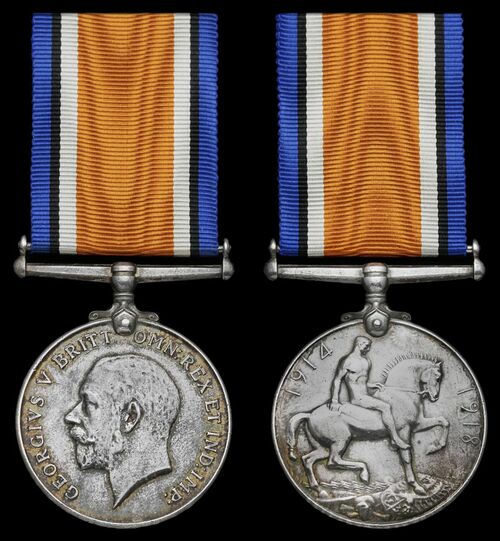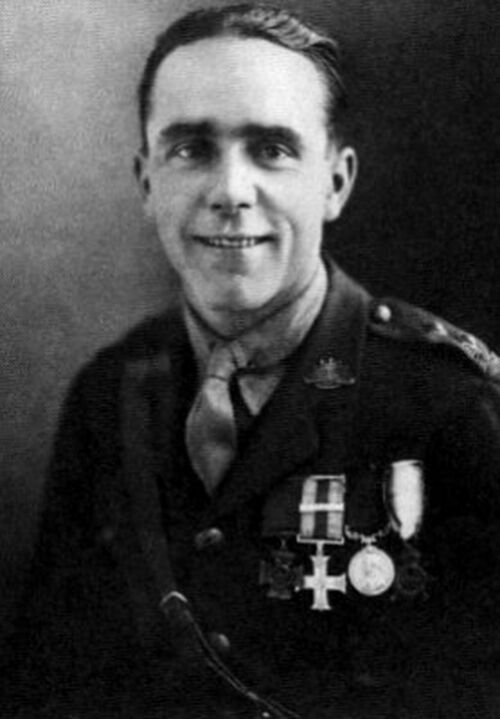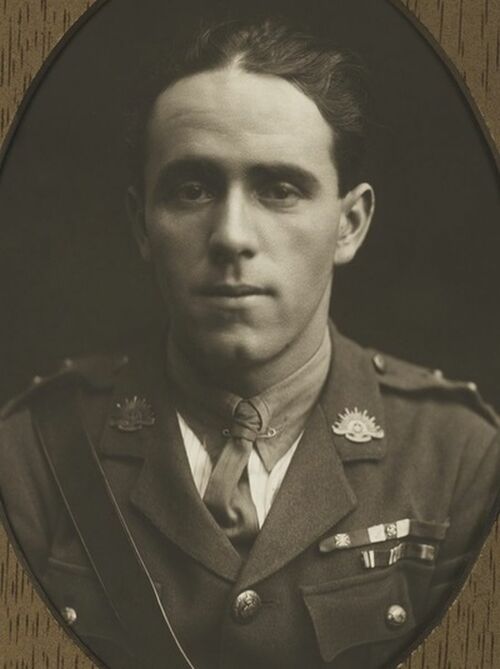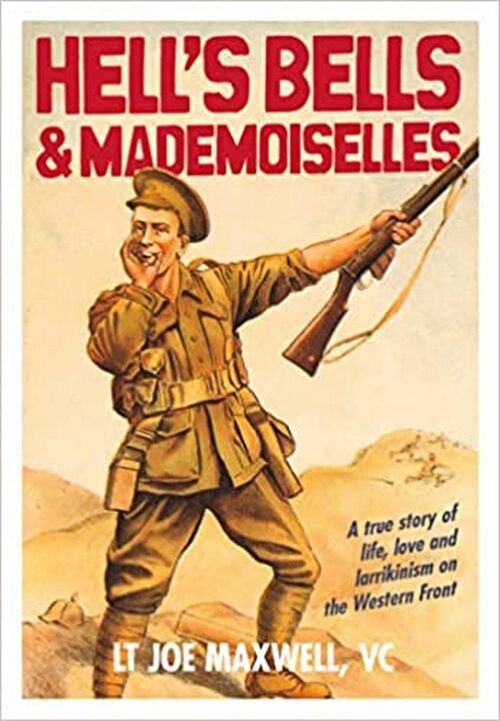Auction: 23001 - Orders, Decorations and Medals
Lot: 53
The important British War Medal awarded to Lieutenant J. Maxwell V.C., M.C. and Bar, D.C.M., 18th Infantry Battalion, Australian Imperial Force
British War Medal 1914-20 (Lieut. J. Maxwell. A.I.F.), struck on thin flan as a later issue, very fine
V.C. London Gazette 6 January 1919:
‘For most conspicuous bravery and leadership in attack on the Beaurevoir-Fonsomme line near Estrees, North of St. Quentin, on the 3 October 1918.
His company commander was severely wounded early in the advance, and Lieutenant Maxwell at once took charge. The enemy wire when reached under intense fire was found to be exceptionally strong and closely supported by machine guns, whereupon Lieutenant Maxwell pushed forward single-handed through the wire and captured the most dangerous gun, killing three and capturing four enemy. He thus enabled his company to penetrate the wire and reach the objective. Later, he again dashed forward and silenced, single-handed, a gun which was holding up a flank company. Subsequently, when with two men only he attempted to capture a strong party of the enemy, he handled a most involved situation very skilfully, and it was due to his resource that he and his comrades escaped.
Throughout the day Lieutenant Maxwell set a high example of personal bravery, coupled with excellent judgement and quick decision.’
M.C. London Gazette 13 May 1918:
‘For conspicuous gallantry and devotion to duty. While in command of a patrol he observed a party of about fifty of the enemy entering a disused trench. He attacked them with bombs and rifle fire, and then assaulted the position and captured a prisoner. He showed splendid initiative and determination.’
M.C. Second Award Bar London Gazette 3 June 1919:
‘For conspicuous gallantry and devotion to duty in the advance at Rainecourt on 9th August 1918. Within thirty minutes of zero he was the only officer left with his company, but kept his men well in hand, notwithstanding machine gun fire, besides fire from an anti-tank gun and a battery of 77 mm. He was close to a tank which was struck by a shell and set on fire, and, though shaken by the explosion, he rushed to the doors and opened them in time for the crew to escape. He showed a fine example of courage and presence of mind.’
D.C.M. London Gazette 27 June 1918:
‘For conspicuous gallantry and devotion to duty. This warrant officer took command of a platoon, and led it forward with great dash. On one of our strong points being heavily barraged, he went forward on his own initiative, and moved the men forward clear of the barrage, during which operations only one casualty was sustained. The action of this warrant officer undoubtedly saved many lives. Throughout the operations he carried out his duties with great skill and was a source of great inspiration by his splendid example.’
Joseph Maxwell, often claimed to be the second most decorated Australian soldier of the Great War, was born on 10 February 1896 at Annandale, Sydney and enlisted in the Australian Imperial Force on 8 February 1915. He was posted to the 18th Battalion and served at Gallipoli before proceeding with his battalion to France in March 1916.
‘In September 1917, during the 3rd Battle of Ypres, Maxwell took command of a platoon after its officer had been killed and led it in the attack. Later he safely extricated men from a newly captured position under intense enemy fire. For this action he was awarded the Distinguished Conduct Medal and a few days later was commissioned in the field as second lieutenant; he was promoted lieutenant in January 1918. In March he led a scouting patrol east of Ploegsteert and after obtaining the required information ordered his men to withdraw. He was covering them when he saw a large party of Germans nearby. Recalling the patrol, he organised and led a successful attack, an action for which he was awarded the Military Cross.
In August, during the offensive near Rainecourt, Maxwell, the only officer in his company who was not a casualty, took command and, preceded by a tank, led his men into the attack on time. The tank received a direct hit and Maxwell, although shaken by the explosion, rescued the crew before the tank burst into flames. He continued the attack and the company reached its objective. He was awarded a Bar to his Military Cross.
Maxwell was awarded the Victoria Cross after an attack on the Beaurevoir-Fonsomme line near Estrées on 3 October. After his company commander was wounded he took charge. Reaching the strong enemy wire under intense fire, he pushed forward alone through a narrow passageway in the wire and captured the most dangerous machine-gun, disposing of the crew. His company was thus able to penetrate the wire and take the objective. Shortly afterwards, again single-handed, he silenced a machine-gun holding up a flank company. Later, with two men and an English-speaking prisoner, he encouraged about twenty Germans in a nearby post to surrender, and in doing so was briefly captured himself. Awaiting his opportunity, he drew a pistol concealed in his respirator haversack, killed two of the enemy and escaped with his men under heavy rifle-fire. He then organised a party and captured the post.
In just over twelve months Maxwell was awarded the D.C.M., the M.C. and Bar and the V.C. and he was only 22 when the war ended. After returning to Australia in 1919 he worked in a variety of occupations in Sydney, Canberra and New South Wales country towns... In 1932, helped by Hugh Buggy, Maxwell published the very successful Hell's Bells and Mademoiselles, an account of the war as he saw it... On 6 July 1967 Maxwell collapsed and died of a heart attack in a street in his home suburb of Matraville.’ (Australian Dictionary of Biography refers).
In 1927, Maxwell moved from Newcastle to Lake Macquarie and in the process of crossing the lake was caught in a storm. His launch was wrecked and '...the whole of my belongings including war decorations & medals, with the exception of the VC Medal which was at my parent's place.'
So it was, in 1949 that his M.C. & Bar, D.C.M. and 1914-15 Trio were officially replaced. His Victoria Cross is on display in the Hall of Valour at the Australian War Memorial, although a physical inspection of those Medals shows that the D.C.M. and Great War Pair on display are unofficially re-engraved examples and this is the original replacement issue. It is interesting to note that the recipient took that view that his Medals should not go on display at 'V.C. Corner' when it opened in 1964 (now the Hall of Valour); sold together with copied research.
The book Venturing into No Man's Land: The Charmed Life of Joseph Maxwell VC, World War I Hero gives a fine account of his life whilst the recipient published Hell's Bells and Mademoiselles.
Subject to 20% VAT on Buyer’s Premium. For more information please view Terms and Conditions for Buyers.
Sold for
£2,800
Starting price
£1500











